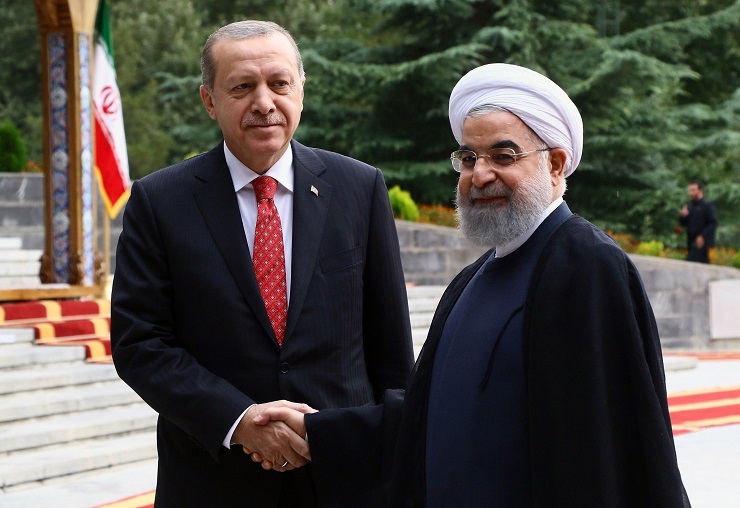If violence begets violence, alliance produces a counter-alliance. The UAE-Bahrain-Israel agreements, called Abraham Accords, marks the beginning of an unholy alliance that aims to bring a decisive shift in the geo-political chessboard of the Middle East, allowing the UAE to increasingly project itself as the new ‘ring leader’ of the Gulf and making Israel the new security overlord, replacing the US. Whereas the UAE’s move comes against the backdrop of its own search for regional dominance in the wake of declining Saudi clout, there is no gainsaying that the real locus of regional rivalry in the Middle East lies in Iran’s and Turkey’s own ambitions, pitting both the non-Arab states against their powerful Arab allies and their common enemy, Israel.
Since the Abraham Accords aim significantly to cut directly at the increasing influence of both Iran (in Iraq, Syria, Lebanon, Yemen) and Turkey (in Syria, Iraq, Libya, the Mediterranean), a potential counter-alliance involving Iran, Turkey and even Qatar becomes a logical off-shoot. This counter-alliance will not only be the new champion of the Palestinian cause, but also configure its relations in ways that would allow them to resist Israel’s stronger foothold in the region as well Gul-Arab hegemony.
As it stands, the Palestinian are already actively encouraging such an alliance. In a recent interview with Tehran Times, Khaled Al-Qaddoumi, the Hamas representative in Tehran, said that the three countries, already benefiting from trade agreements, need to establish a common political vision to counter the common enemy. If the Abraham Accords have brought forth new forces and changed regional landscape, there is no to little denying that Turkey and Iran, already vying for power vis-à-vis the UAE and Saudia, will see merit in forming an alliances to prevent the UAE-Israel alignment from gaining game-changing strategic momentum in the years ahead.
Raw material for such an alliance already exists. Turkey and Iran have deep economic ties. Whereas Tehran already supplies Turkey with energy—oil & gas—leaders of the countries recently met in a virtual event of High-Level Cooperation Council and vowed to increase their bi-lateral trade, taking it up to an ambitious volume of US $30 billion. The joint declaration issued at the end of the event outlined the areas of cooperation, including Syria, Kurds and the Abraham Accords.
Not only did the statement call out the Accords an effort to “undermine the Palestinian question”, but also called for a two-state solution to the decades long conflict.
Their mutual interests tend to converge when it comes to tackling Kurds. The joint statement fully emphasized that “PKK/PJAK and all terrorist organizations in the region pose a common threat against the security of both Turkey and Iran” and “that it is incumbent upon both countries to fully utilize the existing cooperation mechanisms against the activities of PKK/PJAK elements and the other terrorist organizations along the common borders.”
The joint statement received Erdogan’s endorsement in a separate statement when he said that “Turkey and Iran dialogue has a decisive role in the solution of many regional problems.”
For Rouhani, who clearly seemed to see Turkey and Iran as the two targets of Arab-alliance with Israel, “Turkey and Iran are the two great powers of the region. There was hostility and vindictiveness towards both countries. It also exists today. There is no way to be successful against such conspiracies other than by reinforcing friendly relations between the two countries.”
While there is no doubt that both Iran and Turkey have competed each for centuries, both of them have, in recent years, come across a number of reasons to compartmentalize their rivalry and make the most out of tactical convergence over a range of issues that the new regional realities offer.
This is particularly so when it comes to challenging the hegemony of Gulf-Arab states. They were able to come together when Arab states, led by Saudia and the UAE, had decided to impose a blockade on Qatar in 2017. Both Iran and Turkey took significant steps to neutralize the impact of this blockade; hence, the high possibility of Qatar’s inclusion in the Turkey-Iran counter-alliance. Qatar, while a Gulf-Arab state, has its own reasons to forge an alliance. What adds to the reasons is its own position on the Abraham Accords.
“We don’t think that normalisation was the core of this conflict and hence it can’t be the answer,” Lolwah al-Khater, Qatar’s foreign ministry spokesperson said on Monday in an interview with Bloomberg.
While it may be too early to predict what this counter-alliance will actually look like and whether it will become official or not, there is no gainsaying that strong reasons for this alliance do exist and all of these countries are already leaving traces to be picked up by their rivals.
As such, while Iran is already involved in a long-drawn power struggle vis-à-vis Gulf-Arab states and Israel, Turkey, too, is incensed, as it is already embroiled in a proxy war with the UAE in Libya and Syria. Turkish officials have accused the UAE of financial and logistical support for the Kurdistan Workers’ Party in northeastern Syria. Ankara and Abu Dhabi have also clashed over Qatar.
In other words, while, much like Iran-Israel relations, there is no love lost between Turkey and the UAE and Turkey and Israel, there do exist ample reasons for Iran, Turkey and Qatar to capitalize on the new momentum for counter-alliances generated by the powerful geo-political forces that Abraham Accords have let loose in the Middle East. Indeed, the three countries appear to be moving in the same direction.
Salman Rafi Sheikh, research-analyst of International Relations and Pakistan’s foreign and domestic affairs, exclusively for the online magazine “New Eastern Outlook”.
